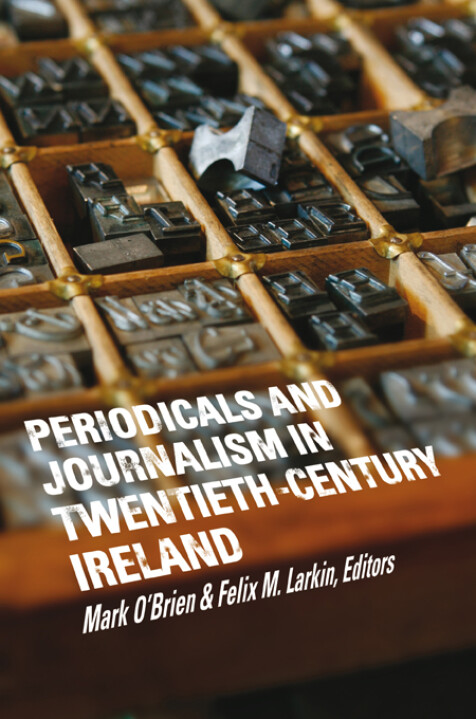Periodicals and journalism in twentieth-century Ireland
Mark O'Brien & Felix M. Larkin editors
‘This book is a valuable resource for anyone interested in the public sphere in this country … one of the most admirable things about this book is the very clear statement of aims set out in the introduction by the editors Mark O’Brien and Felix Larkin … the scholarship and information given are of very high quality, but it is the readability and the connections made between these eclectic texts and their contexts that make the chapters both informative and enjoyable. One leaves this book with a different sense of what was happening in Ireland at this time, as the journalistic perspective embodied in these magazines and journals shines through these essays. There is very much a sense of being caught in the present of each period, and this makes the book valuable to the academic and general reader’, Eugene O'Brien, SHARP news (August 2016).
‘This book is very welcome … the collection offers some great scholarship and a sort of alternative history of the State since independence. Any collection that includes both the Capuchin Annual and Hot Press must be welcome’, Michael Foley, Irish Times (February 2015).
‘Felix Larkin writes an entertaining piece on Dublin Opinion, the whimsical and rather mild satirical magazine of the thirties, forties and fifties … Hot Press gets an enthusiastic and rather breathless endorsement from Joe Bren as a scene-changer and counterculture-shaper’, Hugh McFadden, Books Ireland (May/June 2015).
‘An eclectic collection of essays on an array of Irish periodicals … there is a pleasing balance here between newspapers, literary magazines, religious periodicals and journals with a more countercultural edge … a worthwhile read. Previously unseen interviews with editors and contributors to both Hot Press and Magill are intriguing and informative. Several of the chapters make welcome use of the archives … it is to be hoped that it will prompt further research and engagement in this richly rewarding area of socio-historical and literary scholarship’, Frank Shovlin, Media History (2015).
‘This is the first comprehensive study of its kind of outlets for Irish public intellectuals and journalists who shared Orwell’s reasons for writing … The focus here is on specialist periodicals and magazines. These, according to O’Brien and Larkin, provided outlets for journalists writing against the grain of mainstream Irish society and a space for the diversity of opinion that was not available in the national newspapers or in the provincial press … One of the standout chapters in this collection is Patrick Maume’s “Irish-Ireland and Catholic Whiggery: D.P. Moran” on The Leader … [this book] provide a fascinating overview of the development of critiques of Irish society from the margins as well as insight into the main ideological shifts across the period it covers … it focuses, to good effect, on ideological positions and editorial politics’, Bryan Fanning, Dublin Review of Books (January 2015).
‘This lively collection of 14 essays is a welcome contribution to the study of newspapers and periodicals in Ireland … The book addresses the emergence and development of a wide range of popular periodicals from the suffragette-supporting The Irish Citizen to the religious periodical The Furrow and the contemporary music magazine Hot Press’, Carole O'Reilly, LSE book reviews (February 2015).
‘A fascinating new book … This book explores the world of the Irish periodical journals, many of which were the campaigning, political or revolutionary organs of movements that shaped Irish society in the course of the last century. Culturally these publications are of immense importance to our understanding of the several competing narratives that sought to deliver either a socialist, catholic, republican or Gaelic Ireland as the intellectual life of the newly independent State struggled to create a functioning public sphere for such debates …This book is certainly more than a history of Irish journalism as it provides a much needed and often overlooked insight into a near century-long journey through a contested “space for diversity” towards a peculiarly Irish sense of modernity', Michael Merrigan, Ireland’s Genealogical Gazette (October 2014).
‘In this book, contributors analyse 14 southern Irish periodicals, ranging from Arthur Griffith’s Sinn Fein and Patrick Pearse’s An Claidheamh Soluis from the early years, to the more recent Hot Press and Magill. They were picked for their political or cultural influence, and for a certain “against the grain” style of journalism. The key question raised in this stimulating book is a perennial one in the history of ideas: how, by what agency, does change occur?’, Tony Farmar, Irish Catholic (November 2014).
'What is printed in this volume is an excellent collection of strong essays by authors engaged with important debates in Irish print and journalistic history. There is much in this volume that would be of interest and value to anyone researching not just the media history of the modern state, but more broadly, who is keen to examine how the Irish public was constituted and reconstituted as a reading and media public during this time ... It is a great strength of this current volume that it traces a usable and rigorous history of how Irish journalism migrated from the tumultuous period of state formation to the fraught but interesting contemporary moment of the digital publication and distribution of the news', Robert Brazeau, Irish Studies Review (Mar. 2017).

